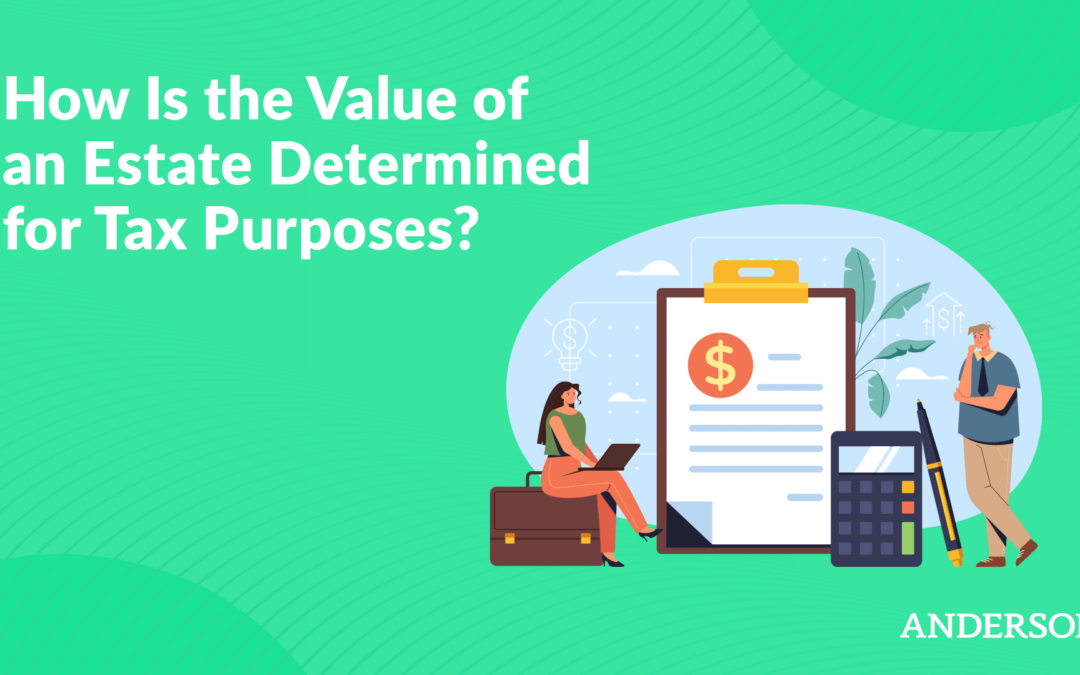
After a person’s death, the total value of their assets, known as their estate, may be subject to an estate tax, or “death tax.” The value of an estate depends on the fair market value of individual assets at the date of the person’s death. This valuation determines whether the estate is subject to taxes. As you plan your estate, it’s beneficial to know how these taxes are determined so you can work to minimize or avoid tax liability on your estate.
Key Takeaways:
- The value of an estate for tax purposes is determined by the fair market value of each asset at the time of death.
- Debts and administrative expenses are deducted from the gross estate to determine the taxable estate.
- Special considerations apply to life insurance, jointly owned property, gifts made before death, and certain trusts.
- It’s essential to consult with tax professionals or estate attorneys to ensure accurate valuation and understanding of tax implications.
- Asset Protection is paramount for all tax purposes
Tax & Asset Protection Workshop
Learn about Real Estate & Asset Protection at our next
FREE LIVE STREAM
Estate Taxes Overview
Federal and state governments determine estate taxes based on the fair market value (FMV) of each asset on your date of death, rather than the asset’s original purchase price. FMV is the price of an asset if sold in the market by a willing buyer to a willing seller, who both have a reasonable knowledge of the asset and its value.
Under FMV, if assets have appreciated in value since their purchase, they will be taxed at the higher value. Similarly, assets that have dropped in value will be assessed at the lower amount. For example, if the estate includes a home purchased for $6 million that has a FMV of $5.5 million at the date of death, it will be taxed at the lower value.
The total value of your estate’s assets is known as the “gross estate.” This term refers to the value of all assets you own at your time of death. These assets may include real estate, stocks, bonds, businesses, and other investments. Once you know the gross estate, you can factor in certain allowable deductions. These may include mortgages, other debts, estate administration expenses, or property that passes to the surviving spouse or qualified charities. By subtracting the deductions from the gross estate, you arrive at the net value, known as the taxable estate.
Federal and State Estate Taxes
While the federal government levies an estate tax, it has an exemption limit for taxable estates. In fact, the Internal Revenue Service estimates most estates won’t need to file a federal estate tax return. It’s only necessary if your gross estate has a value higher than the threshold for your year of death. In 2023, this exemption level increased to $12.92 million.
In addition to federal estate taxes, 12 states and the District of Columbia levy their own estate taxes. If you live in one of those states, your beneficiary will be more likely to pay state estate taxes than the federal tax. Exemption levels for states with estate taxes range from $1 million to $9.1 million, according to the Tax Foundation. State estate taxes apply based on where you, not your beneficiary, are living at the time of your death. The states and jurisdictions that impose estate taxes include:
- Connecticut.
- District of Columbia.
- Hawaii.
- Illinois.
- Maine.
- Massachusetts.
- Maryland.
- Minnesota.
- New York.
- Oregon.
- Rhode Island.
- Vermont.
- Washington.
Valuation Dates
The IRS allows the executor or trustee of your estate to choose between two valuation dates for federal estate taxes. The valuation date can significantly affect the taxable estate, and many people use this date to minimize the amount they pay in estate taxes. Here are the two valuation dates for estate taxes:
Date of Death
Much as it sounds, the date of death valuation refers to the FMV of the estate’s assets at your date of death. For cash, investment, and retirement accounts, the date of valuation includes the statement values on that date. For stocks, the value will be determined by averaging the high and low prices on the date of death. An appraiser may determine the FMV of other assets, such as real estate, on the date of death.
Alternate Valuation Date
In some cases, the executor can choose the alternate valuation date, which is six months after your date of death. If the value of the estate’s assets decreases in those six months, the estate will be taxed at the lower value. In this case, the alternate valuation date can decrease the federal estate taxes your beneficiary will owe. However, keep in mind the alternate valuation date applies to all the estate’s assets. You can’t choose to use the date of death for some assets and the alternate valuation date for others.
Special Considerations
When planning your estate, there are various factors related to estate taxes. Make sure you take these special considerations into account:
Life Insurance
If you own a life insurance policy or have any incidents of ownership, these proceeds become part of the gross estate. They’ll be subject to an estate tax upon your death.
Jointly Owned Property
If you own property jointly with another person, the value of your half of the property is usually included in the gross estate. It depends partly on how the property was acquired and held under state law. However, the specifics can vary widely based on the nature of the joint ownership, so it’s best to consult with a tax or legal professional.
Gifts
Under a provision of the Internal Revenue Code, known as the three-year rule, gifts made within three years of a person’s death may be brought back into their estate for tax purposes. This means if you transfer ownership of property within three years of your death, it will be included in your estate and subject to estate taxes. Some gifts may be exempt from the rule, but others, including those subject to the federal gift tax and certain life insurance policies, are included.
Trusts
Many people arrange trusts as part of their estate plan to minimize estate taxes after their death. However, the value of certain trusts where you retain control or receive benefits from the trust may still be included in your estate. Learn more about Living Trusts.
Foreign Assets
The IRS requires United States citizens and residents to include the value of their worldwide assets as part of their gross estate. An estate tax return is required if the FMV of those assets exceeds the threshold at the time of your death.
FAQs About Estate Taxes
Here are some other frequently asked questions about estate taxes:
What’s Included in an Estate, and What Isn’t?
The gross estate includes everything you own or have interests in at your date of death. These assets may include cash and securities, real estate, trusts, annuities, businesses, insurance, and other assets. The total value of those assets is the gross estate.
Typically, the gross estate excludes property owned solely by your spouse or another individual, lifetime gifts where you have no control over the retained gifts, and life estates where you have no control or power at your date of death.
When Do You Have to File an Estate Tax Return?
The federal estate tax return is due nine months after the date of death. An estate can also request a six-month extension before the due date.
What’s the Estate Tax Rate?
Federal estate taxes have a top rate of 40% on estates exceeding the exemption level. The tax rate for states varies depending on where you live. Hawaii and Washington have the highest top rates at 20%.
Are There Ways To Avoid Estate Taxes?
Yes, there are ways you can minimize your estate tax liability. For example, you can make strategic gifts to lower the value of your estate. These methods can often be complex, so work with a tax accountant or legal professional to learn about the options to minimize estate taxes.
During your lifetime, it’s important to make an estate plan and understand the tax liability on your estate. This way, you can actively work to minimize the liability for your loved ones after your death. Estate planning can involve many considerations and complexities, so don’t leave it to chance. Work with a professional who can guide you through the process of estate planning. At Anderson Advisors, we specialize in helping people structure their assets to minimize taxes and save their loved ones additional stress. Contact us today to schedule a strategy session with an advisor.
Free Strategy Session with an Anderson Advisor
Receive a detailed risk assessment to assist in lowering problem areas that could wipe out all of your assets with one wrong move. Speak with an Anderson Professional Advisor to get your FREE Strategy Session. Limited-Time Offer: FREE (a $750 value.)












